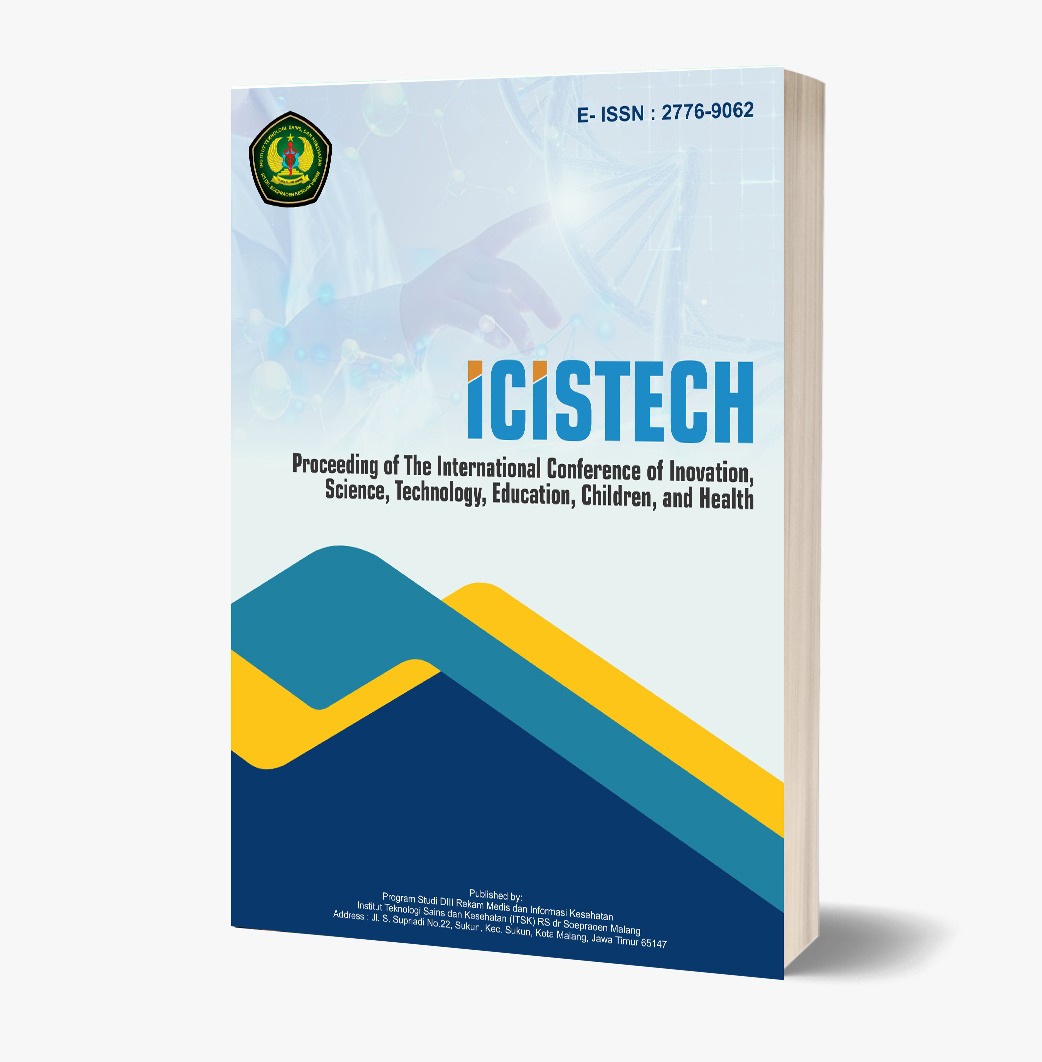The Relationship between the Implementation of Pregnant Women's Classes and Childbirth Anxiety
DOI:
https://doi.org/10.62951/icistech.v5i1.202Keywords:
Anxiety, Childbirth, Education, Pregnancy, WomenAbstract
Anxiety before childbirth is a common psychological condition experienced by pregnant women, particularly those who are primigravida. Such anxiety can be influenced by various factors, including lack of knowledge, fear of pain, and uncertainty about the childbirth process. Prenatal classes are educational programs designed to improve pregnant women’s understanding, confidence, and readiness in facing labor. These classes typically provide information about pregnancy, childbirth, postpartum care, and newborn care. However, the extent to which prenatal classes effectively reduce anxiety before childbirth requires further investigation. This study aimed to determine the relationship between the implementation of prenatal classes and labor anxiety levels among pregnant women. A quantitative research design with a cross-sectional approach was used. The sample consisted of 30 pregnant women selected through purposive sampling. Data were collected using standardized anxiety questionnaires administered before and after participants attended prenatal classes. The data were analyzed using the Chi-Square statistical test with a significance level set at p < 0.05. The findings revealed a significant relationship between participation in prenatal classes and a reduction in labor anxiety, with a p-value = 0.000 (p < 0.05). These results indicate that prenatal classes can play an important role in preparing pregnant women mentally and emotionally for the childbirth process. The interactive education and supportive environment provided during these sessions help participants gain confidence and reduce fear. It is recommended that healthcare providers in health facilities continue to optimize the delivery of prenatal classes by incorporating more interactive methods and involving family members. Family support, in combination with structured prenatal education, can further enhance the effectiveness of these programs in reducing childbirth-related anxiety.
References
Budiarti, S., & Lestari, A. D. (2021). Dampak psikologis ibu hamil yang mengikuti kelas ibu hamil terhadap kecemasan persalinan. Jurnal Kebidanan Indonesia, 12(2), 87-95.
Cahyani, R., & Setyowati, T. (2020). Hubungan antara keikutsertaan kelas ibu hamil dan kesiapan mental menghadapi persalinan. Jurnal Ilmu Kesehatan Masyarakat, 8(3), 130-139.
Delwi, F. A., & Wulandari, R. (2023). Pengaruh kelas ibu hamil terhadap penurunan kecemasan pada ibu primigravida menjelang persalinan. Jurnal Keperawatan dan Kebidanan, 15(1), 33-41. https://doi.org/10.36743/jmhr.v2i1.475
Elka, R. N., & Prasetyo, W. (2021). Manfaat kelas ibu hamil dalam meningkatkan kesiapan menghadapi persalinan. Jurnal Kesehatan Perempuan dan Anak, 10(2), 45-53.
Fitriani, S., & Ramadhani, T. (2022). Hubungan antara keikutsertaan dalam kelas ibu hamil dan tingkat kecemasan menjelang persalinan di Puskesmas X. Jurnal Kebidanan Nasional, 11(4), 112-120.
Gunawan, H., & Suryani, I. (2020). Edukasi prenatal melalui kelas ibu hamil dan dampaknya terhadap kecemasan persalinan. Jurnal Kesehatan Ibu dan Anak, 14(2), 78-85.
Handayani, R., & Kusuma, D. (2023). Kelas ibu hamil sebagai intervensi efektif dalam mengurangi kecemasan menjelang persalinan. Jurnal Kebidanan dan Keperawatan, 13(3), 99-108.
Indrawati, A., & Wahyuni, S. (2021). Pengaruh kelas ibu hamil terhadap pengetahuan dan kecemasan ibu menjelang persalinan. Jurnal Ilmu Kesehatan Kebidanan, 7(1), 55-62.
Jannah, M., & Hidayat, N. (2020). Faktor-faktor yang memengaruhi kecemasan ibu hamil menjelang persalinan: Peran kelas ibu hamil. Jurnal Riset Kebidanan, 6(2), 120-128.
Kusnadi, B., & Lestari, Y. (2022). Efektivitas kelas ibu hamil terhadap kesiapan menghadapi persalinan normal. Jurnal Kesehatan Reproduksi dan Neonatal, 9(1), 88-97.
Maulidah, N., & Pratiwi, D. (2023). Dampak kelas ibu hamil terhadap tingkat kecemasan ibu hamil trimester akhir. Jurnal Kebidanan Sejahtera, 5(2), 76-84.
Nugraheni, R., & Saputri, W. (2021). Hubungan edukasi kehamilan dalam kelas ibu hamil terhadap ketenangan ibu menjelang persalinan. Jurnal Ilmu Kebidanan dan Kesehatan Reproduksi, 14(3), 103-111.
Oktaviani, S., & Mulyadi, R. (2020). Kelas ibu hamil sebagai sarana edukasi dalam mengurangi kecemasan menjelang persalinan. Jurnal Kesehatan Masyarakat Indonesia, 11(4), 65-72.
Putri, D. S., & Yulianti, E. L. (2023). Pengaruh partisipasi dalam kelas ibu hamil terhadap kecemasan persalinan di daerah perkotaan dan pedesaan. Jurnal Kesehatan Global, 7(2), 150-159.
Rinjani, R. P., & Sari, M. (2022). Efektivitas kelas ibu hamil terhadap tingkat kecemasan menjelang persalinan. Jurnal Kesehatan Reproduksi, 9(1), 45-52.
Downloads
Published
How to Cite
Issue
Section
License
Copyright (c) 2025 Proceeding of The International Conference of Inovation, Science, Technology, Education, Children, and Health

This work is licensed under a Creative Commons Attribution-ShareAlike 4.0 International License.













